- Home
- Lauren Oliver
The Spindlers Page 3
The Spindlers Read online
Page 3
“Excuse me,” came a muffled voice from directly underneath her. “But this position is really quite uncomfortable. Quite squashily uncomfortable.”
Liza yelped, and scrambled to her feet.
The fur rug shook itself, unfolded, and stood.
Liza gaped. She saw that it was not a fur rug at all.
It was a rat.
It was the largest—and also the strangest—rat Liza had ever seen. Rather than scuttling around on all fours, first of all, it was standing on its hind legs, and it was so tall it reached almost nose to nose with Liza. It was, second of all—Liza blinked, and rubbed her eyes, and couldn’t believe it—wearing makeup. A thick band of red lipstick circled her narrow lips—Liza assumed the rat was a female, given her appearance—and clots of mascara darkened the tufts of fur above her sparkling black eyes.
Perched on her head was what Liza could only imagine must be a wig of the rat’s own creation: It was made of bits and pieces of different materials, wire and thread and yarn and even some pale yellow hair Liza thought she recognized from the head of her old doll, Amelia. The wig was perched at a slightly rakish angle on the rat’s head, like a hat; two braids framed the rat’s narrow face.
The rat was also wearing clothes. She wore a shawl of lace wrapped around her shoulders and belted at her waist with a bit of knotted rope. And she wore a skirt that appeared to have been glued together with bits and pieces of newspaper. The rat was not, however, wearing any shoes, and Liza saw her strange black feet and long black claws. Rather than letting her tail drag on the ground, the rat carried it slung over one arm, almost like a purse.
Liza did not especially like rats. (Does anybody like rats?) But she thought this must be the most awful-looking rat she had ever seen in her whole life.
The rat had bent down to scoop up a small paper hat, like the kind Liza used to wear as a little kid at birthday parties, which had been flattened.
“You ruined it,” the rat said reproachfully as she tried, and failed, to return the hat to its proper shape. “Who taught you to go around falling on rats and squishing on hats? Terrible, terrible. Must always be mindful of your manners.”
“I didn’t mean to,” Liza said. “I tripped.”
The rat sniffed. “Likely story.” She placed the now-deformed hat on top of her hideous wig, making the animal look even more bizarre than before. Liza unconsciously took a step backward.
“Now, now, no reason to be scuttling away from me,” the rat said. “I’m not going to eat you.”
This was not very comforting to Liza, as she had not been considering the possibility of being eaten until the rat tried to reassure her. But then she did consider it, and felt extremely queasy.
Still, she said, “I’m not afraid,” and tried to keep her voice steady.
“You’re not?” The rat looked pleased. “Oh, how wonderful. How very, very wonderful. I really do hate it—everyone always shrieking and running—and reaching for brooms—brooms!” She stopped and peered at Liza. “You’re not planning to poke me with your broom, are you?”
Liza was unprepared for the question. “N-no,” she stuttered out.
“Or bop me over the head?”
“Of course not,” Liza said.
“Or stick its handle in my eye? Or try to tickle my nose with its bristles?”
“No, no, no.” She began to feel offended. “I would never.”
The rat appeared satisfied. “Then you may have it back, I suppose.” With a surprisingly graceful movement, she bent forward at the waist, snatched the broom from the ground, and handed it back to Liza with the arm—or paw, or whatever it was—around which her tail was looped.
“Now let’s have a good look at you.” Once again, the rat doubled forward and snatched up a plastic lunch box, which she must have been carrying before Liza went tumbling into her. The rat fished around inside it for a moment before extracting a pair of glasses, which she then placed ceremoniously on her nose. The lenses made the rat’s eyes appear golf ball–size.
Liza let out an excited shout. “Where did you get those?” she asked. She knew those wire-frame glasses, with the masking tape that kept the bridge intact.
The rat immediately whipped them from her nose. “I’ve always had them,” she said.
“You haven’t,” Liza said. She reached out and wrenched them from the rat’s paw. “Those are my father’s reading glasses.”
“I tell you, they’re mine!” the rat said shrilly.
But Liza had just caught a glimpse of another familiar item inside the rat’s lunch box, and she grabbed it and squatted down to rifle through it.
“These are Patrick’s socks!” she cried out, extracting the socks that had been the source of all her trouble: the blue ones, embroidered with turtles. “And my missing math homework! And Patrick’s baseball!” She wrapped her father’s glasses in the socks and tucked the bundle carefully into the right pocket of the vest she was wearing over her long-sleeved shirt. The baseball went in the left pocket of her pajama pants; she heard a small rip in the fabric as she wedged it down and against her leg. The homework she left in the lunch box. She doubted very much that Mr. Toddle would accept as an excuse that a rat had stolen it. She didn’t recognize the other things—several more socks, a rusted key, a saltshaker, and a purple hair scrunchie—but she bet that they, too, had been taken from the world above. “You stole them.”
The rat bent down and jerked the lunch box away from Liza. She snapped and latched it closed, and then straightened up again. Liza stood as well, so the rat would not tower over her.
“I did no such thing!” the rat replied in a tone of deep indignation. “I bought them fair and square from the troglods.”
“The what?” Liza said.
“The troglods.” The rat paused and peered at Liza. “Don’t tell me you’ve never heard of the troglod market.”
Liza shook her head.
“My dear child!” the rat exclaimed. “Where have you been? It’s just around the corner. It’s late, but with any luck we might still snatch a sight or two. Come along. Follow me.”
The rat was already bustling off.
“No!” Liza burst out, more loudly than she intended. The rat stopped and looked at her quizzically. “I—I don’t have time.” She closed her eyes and imagined Patrick’s face, smudgy with chocolate—his grass-stained knees and the gap between his bottom teeth.
The rat scurried closer again. She seemed to notice Liza’s sudden change of mood. “Is something wrong?”
“Yes,” Liza confessed. “Something is very wrong. You see, I’m looking for my brother. That is … I’m looking for my brother’s soul. I mean to say …” She sucked in a deep breath. She found it difficult to speak the words, particularly since she was speaking them to an overgrown rat in a wig and paper hat, but she didn’t see what other choice she had. “I mean to say that I am looking for the spindlers’ nests.”
The rat let out a tremendous yelp, jumped forward, and clapped a furry paw over Liza’s mouth. “Shhh,” she hissed. “You must be very careful. Very careful about saying their name Below.”
Liza jerked away, spitting out the taste of dirty fur, which reminded her, unpleasantly, of her aunt Virginia’s mixed-meat pie.
“So you know of the spindlers?” she said.
The rat worried her tail anxiously between two paws. Her large black eyes darted nervously back and forth. “Of course I know of them. Everybody knows of them.” She scrutinized Liza for a moment and then, seeming to come to a decision, leaned closer, so she and Liza were practically whiskers to nose. “It is very difficult,” the rat resumed, in an anxious voice, still watching Liza intently. “Very hard to know nowadays—sides and spies. Spies and spindlers—everywhere, everywhere.”
Liza felt a chill. “Please,” she said. “Do you know where the spindlers make their nests?”
The rat gave another yelp when Liza said the word spindlers. Then she shook her head. Then she nodded. Then she shook her hea
d again, a motion that transformed slowly into another nod.
“Well, which is it?” Liza cried. Even now, she could feel seconds pooling and running away from them. “Yes or no?”
The rat started to speak, and then clamped her mouth shut. Then her eyes bulged, and her cheeks filled with air, as though a word was ballooning behind them. Finally she burst out, “Yes! I know, I know!” Instantly, in a flurry of agitation, she whipped out a small compact and began furiously dusting her face with powder. “Stupid rat,” she muttered. “Stupid, stupid. Always muddling and messing.” She shook her head. “Oh, no. No, no, no.” By now a cloud of powder was swirling all around them, like a faint snow.
“Please,” Liza said desperately. “I’ll do anything!”
The rat stopped. She looked at Liza warily. For a moment Liza saw something flashing behind her eyes—a look of need, or greed. “Do you mean it?” the rat asked, watching Liza closely. “Anything?”
Fear made Liza’s throat swell closed, so instead of speaking, she drew an X over her heart, as she and Patrick always did when they were vowing to each other.
The rat stared at Liza for a second longer. Finally she said, “All right. I will take you there.” Then, in a flash, the rat whirled around and scurried off.
Chapter 5
THE TROGLOD MARKET
Liza had not yet had time to remark on the strangeness of the world she had fallen into. The stone beneath her feet had, she saw, been deliberately carved into a wide, even path, and painted with various instructional signs.
THIS WAY TO THE MARKET!!! was written several times, in large, urgent cursive. Liza had the feeling that the words were shouting at her, an impression only furthered by the addition of several enormous arrows pointing the way.
Other painted messages cluttered the path. BROWSERS ON LEFT; BUYERS ON RIGHT was one, as was NO BITING, KICKING, BARGAINING, OR STINGING. Another one, this time painted in ominous black, read: THIEVES, SHOPLIFTERS, NITPICKERS, AND MISCREANTS MUST APPEAR BEFORE THE JUDGE IN THE COURT OF STONES.
“This is the way to the spindlers’ nests, isn’t it?” Liza asked anxiously, hurrying to catch up to the rat.
“Shhh.” The rat whirled around, nearly whipping Liza in the face with her tail. “What did I tell you about speaking their name?”
“I’m sorry.” Liza took a step backward, alarmed by the intensity of the rat’s expression. “I just want to make certain that—”
“No way to the nests but through the market,” the rat cut her off, and then turned and once again scampered ahead.
All around them were clusters of the strangest houses Liza had ever seen. She knew they were houses because they were fitted with doors and chimneys. But not a single home was taller than her shoulder blade, and all the buildings were assembled of a motley collection of random materials: birdcages and soup pots, bread baskets and cookie tins, all twisted and reassembled and patched back together.
She was touched by the care with which the homes were kept; in front of one house was a well-swept welcome mat; in front of another was a flowerpot half the size of the front door, in which an enormous purple flower was growing. Many of the houses were decorated with curling wisps of colored paper, giving the impression that they were all sprouting multicolored skins.
“Who lives here?” she asked the rat wonderingly.
“Who do you think? The troglods, of course. Ah, here we are now, see? The troglod market. Most of the best finds will have been snatched up by now. Still, there might be a few goodies and goodlies left.”
They had turned a corner and arrived, suddenly, at a large square. Looking at it, Liza’s first feeling was a dizzying sense of free fall.
The vaulted stone ceiling soared upward, like the massive arched top of a cathedral; distantly, lanterns winked among the covering of glossy purple ivy like faraway stars, filling the square with soft white light.
In the center of the plaza was a fountain carved from stone. Liza was not sure what the statue was supposed to represent: It looked like a series of animals grappling with one another, although it was hard to tell, because over the years the stone had begun to wear and chip away in places. But she definitely made out the head of a beaver; and underneath it, she thought she saw the head of a rat. At the very top of the fountain, a carved creature that looked like a cross between a bird and a butterfly was posed, mouth open, expelling a light spray of water that fell in a graceful arch into the fountain’s large stone basin.
All around the market square, different booths had been assembled, again from a hodgepodge of materials, like the houses Liza had just seen, and these, too, were covered with various strips of colored paper.
But that was not what made Liza dizzy.
The vast market square was full of rocks, and all the rocks were moving.
Liza blinked. No—not rocks. They were small, round, rock-shaped creatures, with cracked brown-and-gray hides, nubby arms and legs, large, winking black eyes, and drooped noses that looked like very wrinkled baked potatoes. There were hundreds of them, many carrying wire baskets, or burlap sacks, or lunch boxes nearly half their size, which they were using as makeshift grocery carts.
They pushed and jostled and called to one another. The square was filled with a swell of different voices: some as low as a growl, some like the sound of a fluted high note. The din was tremendous; it made Liza’s head pound.
“Troglods,” she said.
The rat adjusted her crushed paper hat and nodded. “Very smart, the troglods,” she said sagely. “You know what they say: Never try to cheat a troglod! It’s like trying to outsniff a sningle. Now follow me, follow me. This way, please, this way.”
As Liza and the rat began pushing their way into the market square, Liza saw that the cloth rags papering the booths were actually signs. SOCKS FOR FIVE PURPLES! said one. NEW PEN CAPS, THREE FOR A YELLOW! said another. Liza could hear, too, snatches of individual conversations.
“Outrageous! Last week it was one green for a key, and now they’re trying to charge me a blue!”
“Tin cans for a bargain! Two reds gets you two cans!”
“Don’t you try to tell me this sock doesn’t have a hole in the heel! Do you take me for a dingle-bat?”
“What’s all the colored paper for?” Liza said. Despite her anxiety, she couldn’t help but be curious. Everywhere, troglods were exchanging small slips of colored paper: reds, blues, greens, and purples. Some of them looked to have been cut away from cardboard cereal boxes or greeting cards; others looked like scraps of wrapping paper.
The rat stared at her in amazement. “You didn’t think the market was free, did you?” The rat shook her head. “Personally,” she continued, “I’ve never understood why the world Above is so crazy for green. Absolutely mad for it!” The rat dropped her voice again. “I’ve always been a fan of pink. Very rare, of course … very hard to come by … extremely valuable … the troglods would give up their houses for a half-dozen pinks....”
“But—” Liza was going to point out that in her world people used real money, not just worthless slips of paper, but it occurred to her that she wasn’t actually certain of the difference, and so she said nothing.
“Get your bottle caps! Get your bottle caps! Two reds and a bargain at that!”
“Batteries! Used batteries, right here! Best in the market!”
As they moved through the market, a few troglods shot her a curious look, but most of them continued bustling on their way, squabbling and bargaining, picking over the booths—which were, Liza saw, filled with all the little nips and bops that always seemed to get lost: stray socks and old keys; lipstick tubes and sunglasses; used Post-it Notes and packs of gum.
Liza remembered what her father had once said: Glasses don’t just get up and walk away by themselves. And it was true. The troglods were walking away with them. She realized, with a jolt, that everything she had mysteriously lost over the years—her sheet of butterfly stickers in second grade, her favorite crystal barrette,
the locket she had inherited from her grandmother—might very well have ended up here, at the troglod market.
She realized, additionally, that she had seen a troglod before. She recognized the wrinkly brown backsides.
“There was a troglod in my yard only last week,” Liza burst out. They were nearing the end of the market, where it was a little quieter. “I thought it was a gnome.”
The rat let out a peal of laughter. She whipped out a handkerchief and dabbed the corner of her eyes, which were smeary with mascara. “A gnome! Bless you. What an idea.”
“So … gnomes aren’t real?” Liza asked.
The rat stared. “Of course they’re real. But who ever heard of a gnome living all the way down here? The gnomes are northern creatures. Wouldn’t be caught dead beneath the eleventh parallel.”
Liza felt warmth flare in her stomach. So Anna had been right about the gnomes—they did like the cold.
But that meant she had probably been right about the spindlers, too. The warmth drained out of her at once. She thought about the last time she had asked Anna what on earth the spindlers needed souls for—how Anna’s face had gone paper-white, how her eyes had gone blank and frightened, like someone suffering from a bad shock. How she had shaken her head sadly, without saying a word.
The rat sensed her change in mood. “Come on,” she said, and scuttled on.
Liza put a hand in her pocket and squeezed the baseball pressing into her thigh. And even though she was not Above, and was not standing with her face in the fir tree, she allowed herself to make a wish.
This one I will tell you:
Please, please, please. Let me rescue Patrick in time.
Chapter 6
THE LUMER-LUMPEN
They moved into an area of dense forest. All the trees were covered in layers of thick, green moss, as though they were draped with fuzzy blankets. The air smelled like wet, new earth, and Liza saw large, jewel-colored butterflies flitting through the trees. It was clear, however, that the path was well-traveled. Above their heads, the same pale, glowing lanterns were nestled among the canopy of vine- and moss-covered branches, which reminded Liza of long fingers encased in green woolen gloves, knitted tightly together.

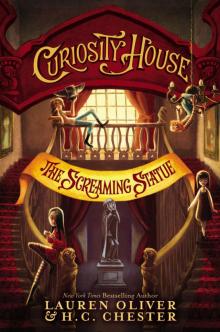 The Screaming Statue
The Screaming Statue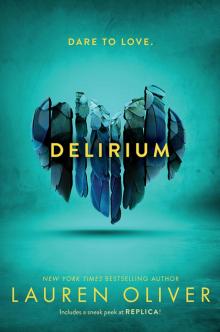 Delirium
Delirium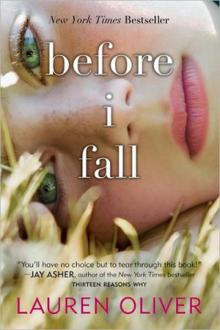 Before I Fall
Before I Fall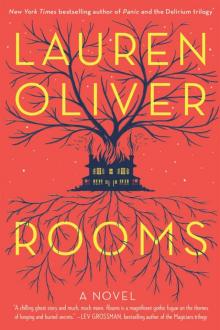 Rooms
Rooms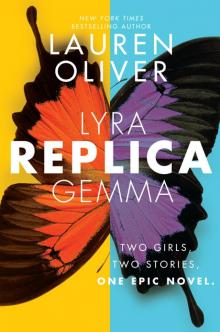 Replica
Replica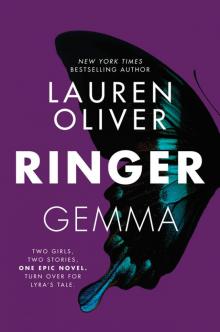 Ringer
Ringer Pandemonium
Pandemonium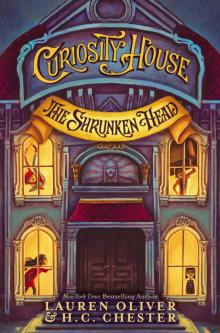 The Shrunken Head
The Shrunken Head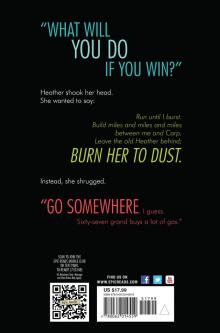 Panic
Panic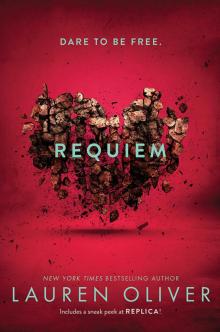 Requiem
Requiem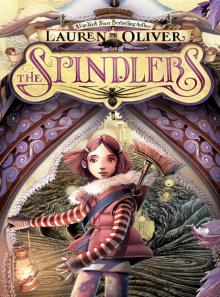 The Spindlers
The Spindlers Annabel
Annabel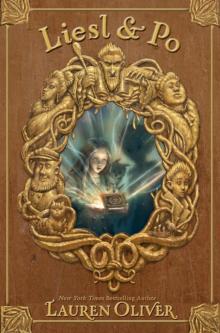 Liesl & Po
Liesl & Po Raven
Raven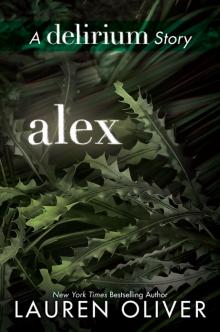 Alex
Alex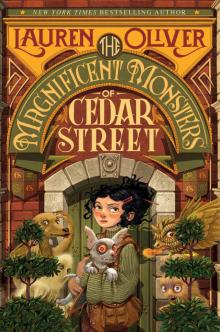 The Magnificent Monsters of Cedar Street
The Magnificent Monsters of Cedar Street Vanishing Girls
Vanishing Girls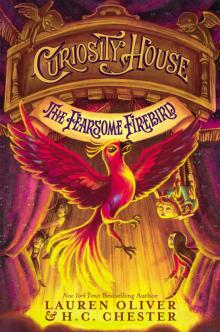 The Fearsome Firebird
The Fearsome Firebird Raven: A Delirium Short Story
Raven: A Delirium Short Story Annabel: A Delirium Short Story
Annabel: A Delirium Short Story Hana: A Delirium Short Story
Hana: A Delirium Short Story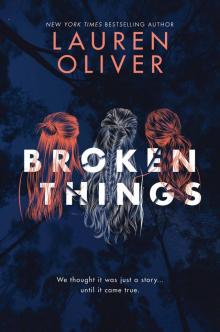 Broken Things
Broken Things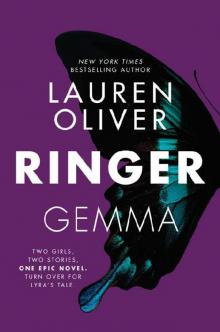 Ringer (Replica)
Ringer (Replica) Alex (delirium)
Alex (delirium)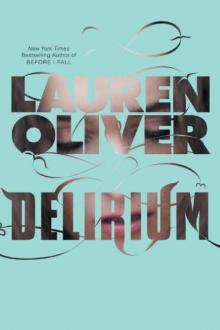 Delirium dt-1
Delirium dt-1